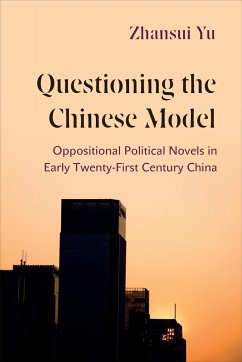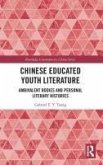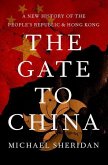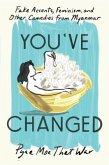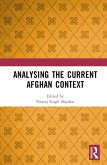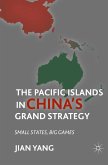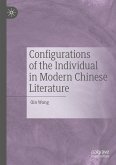Zhansui Yu
Questioning the Chinese Model
Oppositional Political Novels in Early Twenty-First Century China
Zhansui Yu
Questioning the Chinese Model
Oppositional Political Novels in Early Twenty-First Century China
- Gebundenes Buch
- Merkliste
- Auf die Merkliste
- Bewerten Bewerten
- Teilen
- Produkt teilen
- Produkterinnerung
- Produkterinnerung
Questioning the Chinese Model sheds light on oppositional political novels produced in early twenty-first century China.
Andere Kunden interessierten sich auch für
![Chinese Educated Youth Literature Chinese Educated Youth Literature]() Gabriel F Y TsangChinese Educated Youth Literature200,99 €
Gabriel F Y TsangChinese Educated Youth Literature200,99 €![The Gate to China The Gate to China]() Michael SheridanThe Gate to China29,99 €
Michael SheridanThe Gate to China29,99 €![You've Changed: Fake Accents, Feminism, and Other Comedies from Myanmar You've Changed: Fake Accents, Feminism, and Other Comedies from Myanmar]() Pyae Moe Thet WarYou've Changed: Fake Accents, Feminism, and Other Comedies from Myanmar23,99 €
Pyae Moe Thet WarYou've Changed: Fake Accents, Feminism, and Other Comedies from Myanmar23,99 €![Analysing the Current Afghan Context Analysing the Current Afghan Context]() Analysing the Current Afghan Context177,99 €
Analysing the Current Afghan Context177,99 €![The Pacific Islands in China's Grand Strategy The Pacific Islands in China's Grand Strategy]() J. YangThe Pacific Islands in China's Grand Strategy119,99 €
J. YangThe Pacific Islands in China's Grand Strategy119,99 €![Identity and Change in East Asian Conflicts Identity and Change in East Asian Conflicts]() Identity and Change in East Asian Conflicts61,99 €
Identity and Change in East Asian Conflicts61,99 €![Configurations of the Individual in Modern Chinese Literature Configurations of the Individual in Modern Chinese Literature]() Qin WangConfigurations of the Individual in Modern Chinese Literature66,99 €
Qin WangConfigurations of the Individual in Modern Chinese Literature66,99 €-
-
-
Questioning the Chinese Model sheds light on oppositional political novels produced in early twenty-first century China.
Hinweis: Dieser Artikel kann nur an eine deutsche Lieferadresse ausgeliefert werden.
Hinweis: Dieser Artikel kann nur an eine deutsche Lieferadresse ausgeliefert werden.
Produktdetails
- Produktdetails
- Verlag: University of Toronto Press
- Seitenzahl: 266
- Erscheinungstermin: 15. März 2023
- Englisch
- Abmessung: 230mm x 154mm x 22mm
- Gewicht: 522g
- ISBN-13: 9781487544348
- ISBN-10: 1487544340
- Artikelnr.: 66144030
- Herstellerkennzeichnung
- Libri GmbH
- Europaallee 1
- 36244 Bad Hersfeld
- gpsr@libri.de
- Verlag: University of Toronto Press
- Seitenzahl: 266
- Erscheinungstermin: 15. März 2023
- Englisch
- Abmessung: 230mm x 154mm x 22mm
- Gewicht: 522g
- ISBN-13: 9781487544348
- ISBN-10: 1487544340
- Artikelnr.: 66144030
- Herstellerkennzeichnung
- Libri GmbH
- Europaallee 1
- 36244 Bad Hersfeld
- gpsr@libri.de
By Zhansui Yu
Acknowledgments
Introduction: Rise of Oppositional Chinese Political Novels
Chinese Political Fiction in the Twentieth Century
Sociopolitical Crisis and Re-politicization of Society in the New Century
Propitious Circumstances for Political Articulation
Scope, Themes, Methodology, and Structure of the Book
1. Destruction of Communist Myths
Them versus Us: Subversion of the Party-People Myth
From Critics to Servants: Changed Role of Chinese Intellectuals after
Tiananmen
Nationalism as State Ideology
Ideologization of Morality, Hedonism, and Political Acquiescence
Summary
2. Wolf Totem: Paradoxical Eulogy to a Culture
Wolf Totem and Mongolian Correlative Cosmology
Social Darwinism, Reverse Chauvinism, and Nationalism
A Wolf Destroyed by the "Wolf Logic"
Ideological Hegemony behind a Literary Sensation
Summary
3. Lenin’s Kisses: Absurdity, Dehumanization, and Dilemma of the Chinese
Utopia
Revolution as Nightmare
Contemporary Freak Show: Absurdity and Cruelty of the Biopolitics of a
Utopia
"With Money, Anything Is Possible"
Arbitrariness of Power, Sustainability of Dictatorship, and Dead-End Future
Summary
4. Such Is This World@sars.come: Dictatorship as a Fatal Disease
"Lockdown" as Social Reality and Political Allegory
The Terrifying "Old Crone" behind the Screen
The Chinese Intelligentsia after Tiananmen: Cynicism and Division
Two Faces of the Party: Ugliness behind a Lovely Mask
Summary
5. The Fat Years: Social Injustice, Forced Amnesia, Distorted Mentality,
and Fascism
Fake Paradise: Darkness behind the Chinese "Miracle"
Falsified History and Forced Amnesia
Mental Distortion and Spiritual Agony
"Fascism? We Are Only in Its Early Stages!"
Summary
6. The Seventh Day: Dystopian Wasteland versus Modern Peach Blossom Spring
Bloody Predation and Deceptive Propaganda
Destruction of Sanctified Human Feelings
Banality of Evil: Callous Indifference and Moral Corruption
Peach Blossom Spring: Utopia of Truth, Love, and Happiness
Summary
Epilogue: Limits of Transgression and Mechanisms of Counter-Censorship
Notes
Bibliography
Index
Introduction: Rise of Oppositional Chinese Political Novels
Chinese Political Fiction in the Twentieth Century
Sociopolitical Crisis and Re-politicization of Society in the New Century
Propitious Circumstances for Political Articulation
Scope, Themes, Methodology, and Structure of the Book
1. Destruction of Communist Myths
Them versus Us: Subversion of the Party-People Myth
From Critics to Servants: Changed Role of Chinese Intellectuals after
Tiananmen
Nationalism as State Ideology
Ideologization of Morality, Hedonism, and Political Acquiescence
Summary
2. Wolf Totem: Paradoxical Eulogy to a Culture
Wolf Totem and Mongolian Correlative Cosmology
Social Darwinism, Reverse Chauvinism, and Nationalism
A Wolf Destroyed by the "Wolf Logic"
Ideological Hegemony behind a Literary Sensation
Summary
3. Lenin’s Kisses: Absurdity, Dehumanization, and Dilemma of the Chinese
Utopia
Revolution as Nightmare
Contemporary Freak Show: Absurdity and Cruelty of the Biopolitics of a
Utopia
"With Money, Anything Is Possible"
Arbitrariness of Power, Sustainability of Dictatorship, and Dead-End Future
Summary
4. Such Is This World@sars.come: Dictatorship as a Fatal Disease
"Lockdown" as Social Reality and Political Allegory
The Terrifying "Old Crone" behind the Screen
The Chinese Intelligentsia after Tiananmen: Cynicism and Division
Two Faces of the Party: Ugliness behind a Lovely Mask
Summary
5. The Fat Years: Social Injustice, Forced Amnesia, Distorted Mentality,
and Fascism
Fake Paradise: Darkness behind the Chinese "Miracle"
Falsified History and Forced Amnesia
Mental Distortion and Spiritual Agony
"Fascism? We Are Only in Its Early Stages!"
Summary
6. The Seventh Day: Dystopian Wasteland versus Modern Peach Blossom Spring
Bloody Predation and Deceptive Propaganda
Destruction of Sanctified Human Feelings
Banality of Evil: Callous Indifference and Moral Corruption
Peach Blossom Spring: Utopia of Truth, Love, and Happiness
Summary
Epilogue: Limits of Transgression and Mechanisms of Counter-Censorship
Notes
Bibliography
Index
Acknowledgments
Introduction: Rise of Oppositional Chinese Political Novels
Chinese Political Fiction in the Twentieth Century
Sociopolitical Crisis and Re-politicization of Society in the New Century
Propitious Circumstances for Political Articulation
Scope, Themes, Methodology, and Structure of the Book
1. Destruction of Communist Myths
Them versus Us: Subversion of the Party-People Myth
From Critics to Servants: Changed Role of Chinese Intellectuals after
Tiananmen
Nationalism as State Ideology
Ideologization of Morality, Hedonism, and Political Acquiescence
Summary
2. Wolf Totem: Paradoxical Eulogy to a Culture
Wolf Totem and Mongolian Correlative Cosmology
Social Darwinism, Reverse Chauvinism, and Nationalism
A Wolf Destroyed by the "Wolf Logic"
Ideological Hegemony behind a Literary Sensation
Summary
3. Lenin’s Kisses: Absurdity, Dehumanization, and Dilemma of the Chinese
Utopia
Revolution as Nightmare
Contemporary Freak Show: Absurdity and Cruelty of the Biopolitics of a
Utopia
"With Money, Anything Is Possible"
Arbitrariness of Power, Sustainability of Dictatorship, and Dead-End Future
Summary
4. Such Is This World@sars.come: Dictatorship as a Fatal Disease
"Lockdown" as Social Reality and Political Allegory
The Terrifying "Old Crone" behind the Screen
The Chinese Intelligentsia after Tiananmen: Cynicism and Division
Two Faces of the Party: Ugliness behind a Lovely Mask
Summary
5. The Fat Years: Social Injustice, Forced Amnesia, Distorted Mentality,
and Fascism
Fake Paradise: Darkness behind the Chinese "Miracle"
Falsified History and Forced Amnesia
Mental Distortion and Spiritual Agony
"Fascism? We Are Only in Its Early Stages!"
Summary
6. The Seventh Day: Dystopian Wasteland versus Modern Peach Blossom Spring
Bloody Predation and Deceptive Propaganda
Destruction of Sanctified Human Feelings
Banality of Evil: Callous Indifference and Moral Corruption
Peach Blossom Spring: Utopia of Truth, Love, and Happiness
Summary
Epilogue: Limits of Transgression and Mechanisms of Counter-Censorship
Notes
Bibliography
Index
Introduction: Rise of Oppositional Chinese Political Novels
Chinese Political Fiction in the Twentieth Century
Sociopolitical Crisis and Re-politicization of Society in the New Century
Propitious Circumstances for Political Articulation
Scope, Themes, Methodology, and Structure of the Book
1. Destruction of Communist Myths
Them versus Us: Subversion of the Party-People Myth
From Critics to Servants: Changed Role of Chinese Intellectuals after
Tiananmen
Nationalism as State Ideology
Ideologization of Morality, Hedonism, and Political Acquiescence
Summary
2. Wolf Totem: Paradoxical Eulogy to a Culture
Wolf Totem and Mongolian Correlative Cosmology
Social Darwinism, Reverse Chauvinism, and Nationalism
A Wolf Destroyed by the "Wolf Logic"
Ideological Hegemony behind a Literary Sensation
Summary
3. Lenin’s Kisses: Absurdity, Dehumanization, and Dilemma of the Chinese
Utopia
Revolution as Nightmare
Contemporary Freak Show: Absurdity and Cruelty of the Biopolitics of a
Utopia
"With Money, Anything Is Possible"
Arbitrariness of Power, Sustainability of Dictatorship, and Dead-End Future
Summary
4. Such Is This World@sars.come: Dictatorship as a Fatal Disease
"Lockdown" as Social Reality and Political Allegory
The Terrifying "Old Crone" behind the Screen
The Chinese Intelligentsia after Tiananmen: Cynicism and Division
Two Faces of the Party: Ugliness behind a Lovely Mask
Summary
5. The Fat Years: Social Injustice, Forced Amnesia, Distorted Mentality,
and Fascism
Fake Paradise: Darkness behind the Chinese "Miracle"
Falsified History and Forced Amnesia
Mental Distortion and Spiritual Agony
"Fascism? We Are Only in Its Early Stages!"
Summary
6. The Seventh Day: Dystopian Wasteland versus Modern Peach Blossom Spring
Bloody Predation and Deceptive Propaganda
Destruction of Sanctified Human Feelings
Banality of Evil: Callous Indifference and Moral Corruption
Peach Blossom Spring: Utopia of Truth, Love, and Happiness
Summary
Epilogue: Limits of Transgression and Mechanisms of Counter-Censorship
Notes
Bibliography
Index

